Dutch volunteers Franky van Hintum and Coen van Oosten provide free meals to people in Ukraine, even under fire. Franky’s wife is Ukrainian, and they’ve been married for 24 years, so he deeply understands the suffering and pain of Ukrainians. After the full-scale invasion, these two friends from the Netherlands, who own a mobile fast food business, decided to help Ukrainians fleeing to the border to escape Russian attacks. Without hesitation, they got into their food truck and drove to Poland. At first, they prepared and distributed food for free at the Ukrainian-Polish border. Later, they began feeding people near the front lines with fries, sausages, and cheese soufflé. Together, they traveled to many Ukrainian cities: Izium, Kharkiv, Kherson, Mykolaiv, Pokrovsk, Sviatohirsk, and Kramatorsk.
In Kramatorsk, the volunteers narrowly survived a horrifying tragedy on June 27, 2023, when Russian forces launched two rocket attacks on the city, hitting a pizzeria where Franky and Coen were at the time. Thirteen people were killed, and 64 were wounded. The day after the tragedy, June 28, has become their second "birthday," and the experience further motivated them to support Ukraine. The Dutch volunteers increased their efforts to assist Ukrainian soldiers, help civilians evacuate, and establish a temporary shelter in Dnipro for civilians evacuated from conflict zones. They also organize international trips for Ukrainian children and work to counter Russian propaganda and fakes.
THERE WERE HUNDREDS OF PEOPLE IN FRONT OF US WHO NEEDED TO BE FED
The Russian armed aggression has continued for over ten years, and the full-scale Russian invasion of Ukraine for more than two. After February 24, 2022, you decided to support Ukrainians and went to distribute food. Tell us, how did your volunteer work begin, and where did the idea of traveling with a food truck originate?
Franky: - I remember very well the first day of the full-scale invasion, as my wife is Ukrainian, from Kyiv. Early in the morning, she woke me up and told me that there was a major war in Ukraine. The war in Ukraine had been ongoing, but this was now full-scale: heading toward Kyiv and all over the country. Her sister lives in Kyiv. So, I remember very well what was happening in our home. It was a huge shock because she was incredibly worried about her sister and other family and friends.
Coen: - I learned about the full-scale invasion from the television and was horrified by what I saw. Then we spoke on the phone and decided to do something, to join forces to help people.
Franky: - Yes, I called Coen and suggested, “What if we take our food truck to the Polish-Ukrainian border and hand out fries and various snacks?” News reports were saying that hundreds of thousands of people were fleeing the war and needed help and food.
Coen: - I immediately said I was ready to go to the border with Ukraine. The next day, we sat across from each other at a table and began planning who was responsible for what and what each of us would do.
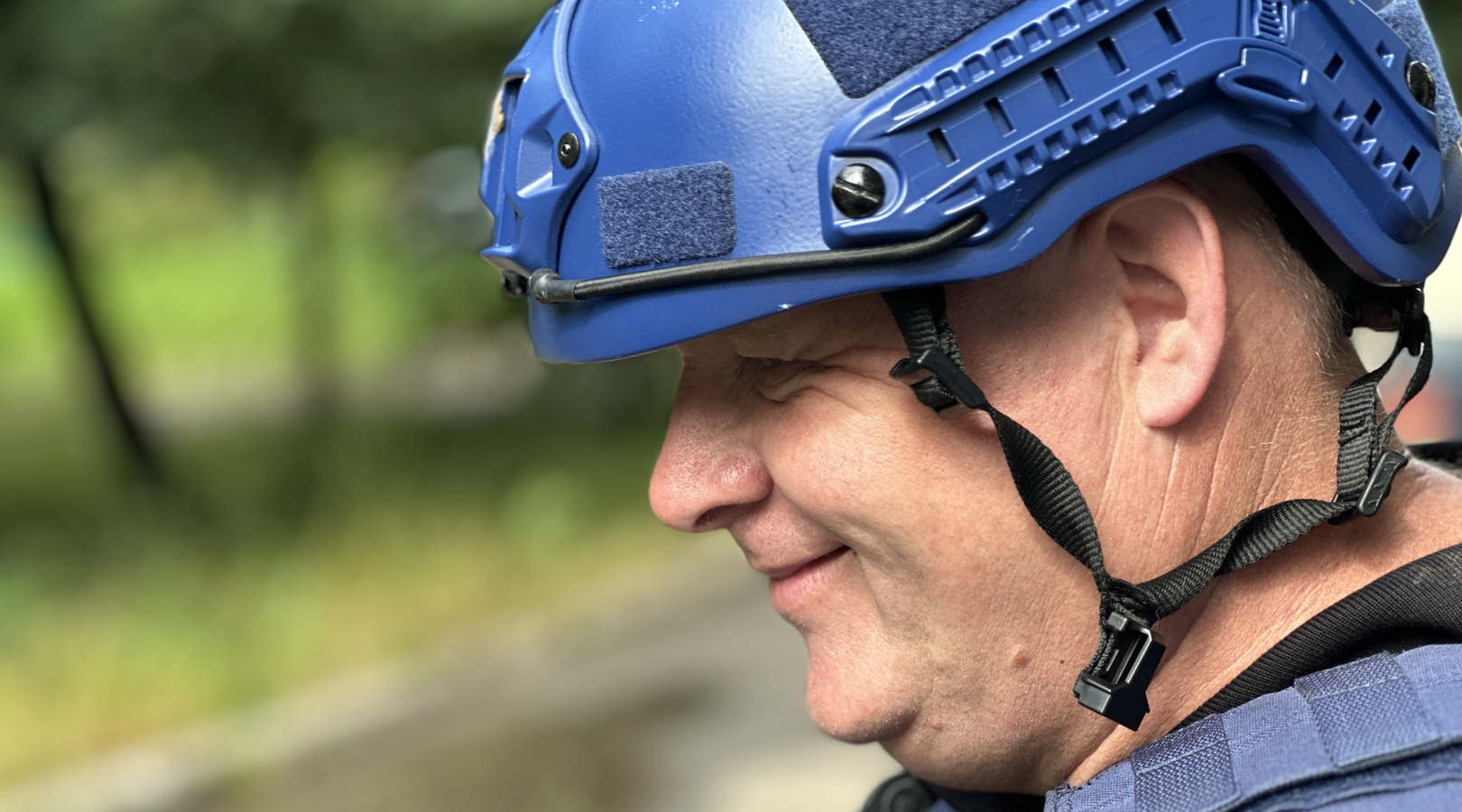
- How did you prepare for the journey? Where did you get the money?
Franky: - So, we started with only 5,000 euros. Each of us put 2,500 euros on the table to buy fries and snacks. We got in the car, hooked up the food truck, and headed to the Polish border, having no idea what lay ahead.
- How were you received at the border? Were you given the “green light,” so to speak, to distribute food?
We handed out over 2,000 portions a day and listened to terrible stories.
Coen: - There were so many people around us, and we just drove through. Some people were shouting that they were happy to see us, others pointed to where we should go and where we could set up. Everyone was acting quickly and cooperatively.
Franky: - We didn’t know where to go. Then someone told us there was a large shopping center nearby, empty, and they were receiving people from Ukraine there. As we drove, we saw hundreds and hundreds, maybe even a few thousand people walking. It was very crowded. Fellow volunteers who were also distributing food cheered when they saw our food truck arrive because they didn’t know how they were going to feed all the people, and the crowd kept growing. They said, “There’s no need to register anywhere; there’s no time for that. Just set up your food truck and start working.” Within half an hour, there were hundreds of people in front of us who needed to be fed. We handed out over 2,000 portions a day and listened to terrible stories.
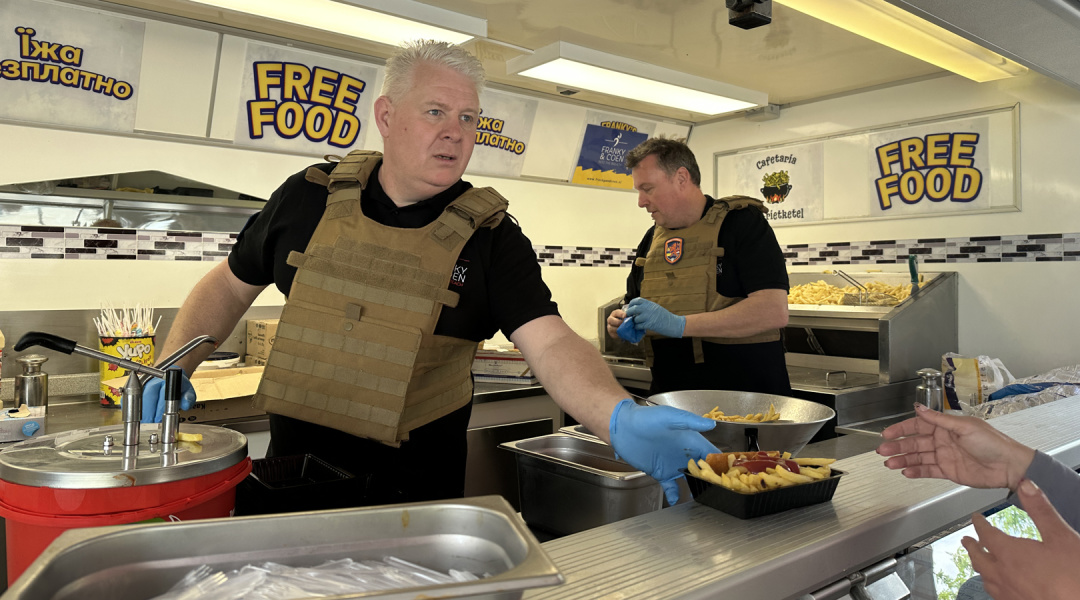
IT IS VERY IMPORTANT FOR UKRAINIANS TO FEEL SUPPORTED, ESPECIALLY NOW
- Which stories impacted you the most?
Franky: - I was shocked when a woman received a call informing her that her husband had died. There were people who had traveled for 5-6 days just to reach the border. We were also shown a photo of a car marked “children,” riddled with bullet holes. That was one of the most emotional moments. The first week was very emotional. Adults with children lay on mattresses on the floor of a former supermarket. We were also at the train station and saw a train arrive. People got off, like in old war movies, exhausted and overwhelmed with stress. Their eyes were filled with horror and despair. They knew they were in Poland, but no one knew what would come next.
Coen: - I’ll never forget a young girl with an empty look in her eyes. I offered her some fries, but she didn’t respond. I asked again, “Maybe some fries with ketchup?” I don’t know why, but her face changed, maybe because it reminded her of something good, and she smiled. I also offered her some sweets. She came back a few more times, as if she felt safe with us. We were so happy to help her.
Franky: - There was also an elderly couple. They arrived just as we were closing up, but we couldn’t leave them hungry. So we started frying sausages again, got some cheese and fries, and fed them. They told us they were heading to relatives in France. I asked if they had enough money for such a journey. The man said they did, showing a few hundred euros, but from the look in his wife’s eyes, I could tell they didn’t have much saved for this trip. So we insisted on helping them financially.
- This was your first trip to Poland to help Ukrainian refugees. When did you decide to cross the border to witness the horrors of war that Ukrainians had been telling you about in Poland?
Coen: - We had no experience or understanding of what war really is, but we had a strong desire to help. We were moved by the stories people told us and felt we had to do something. We’d never been to a country at war. Later, some fellow volunteers from Austria, I think, said they were going to cross the border because there were many people who needed help on the other side. They promised to share their experiences with us and tell us about the situation. They said that on the Ukrainian side, they hadn’t actually seen any missiles.
Franky: - So we decided to cross the border. Then we began traveling to different regions of Ukraine. We started in Lviv and later went to Irpin, Bucha, and BorodIanka. We saw ruined streets and shattered buildings with our own eyes. That was when we truly felt the war. The Russians had already been driven out, but you could see the aftermath. There were tanks, and exhausted people who shared horrific stories of what they had endured. The worst part was that people couldn’t escape from that hell. They couldn’t run because they’d be shot on the street, so they had to stay inside, hoping for the best.
One man came for fries and snacks. Suddenly, he read on our food truck that we were from the Netherlands, and he broke down in tears because he was so touched that we’d come from another country to help. It’s very important for Ukrainians to feel supported, especially now, as more than two years have passed. You know, people get tired, and sometimes they see or hear different politicians, and they start to feel that they’re no longer of interest to the EU or other countries. But when they see foreign volunteers in Ukraine, helping and showing support, it gives them strength and motivation to keep fighting.
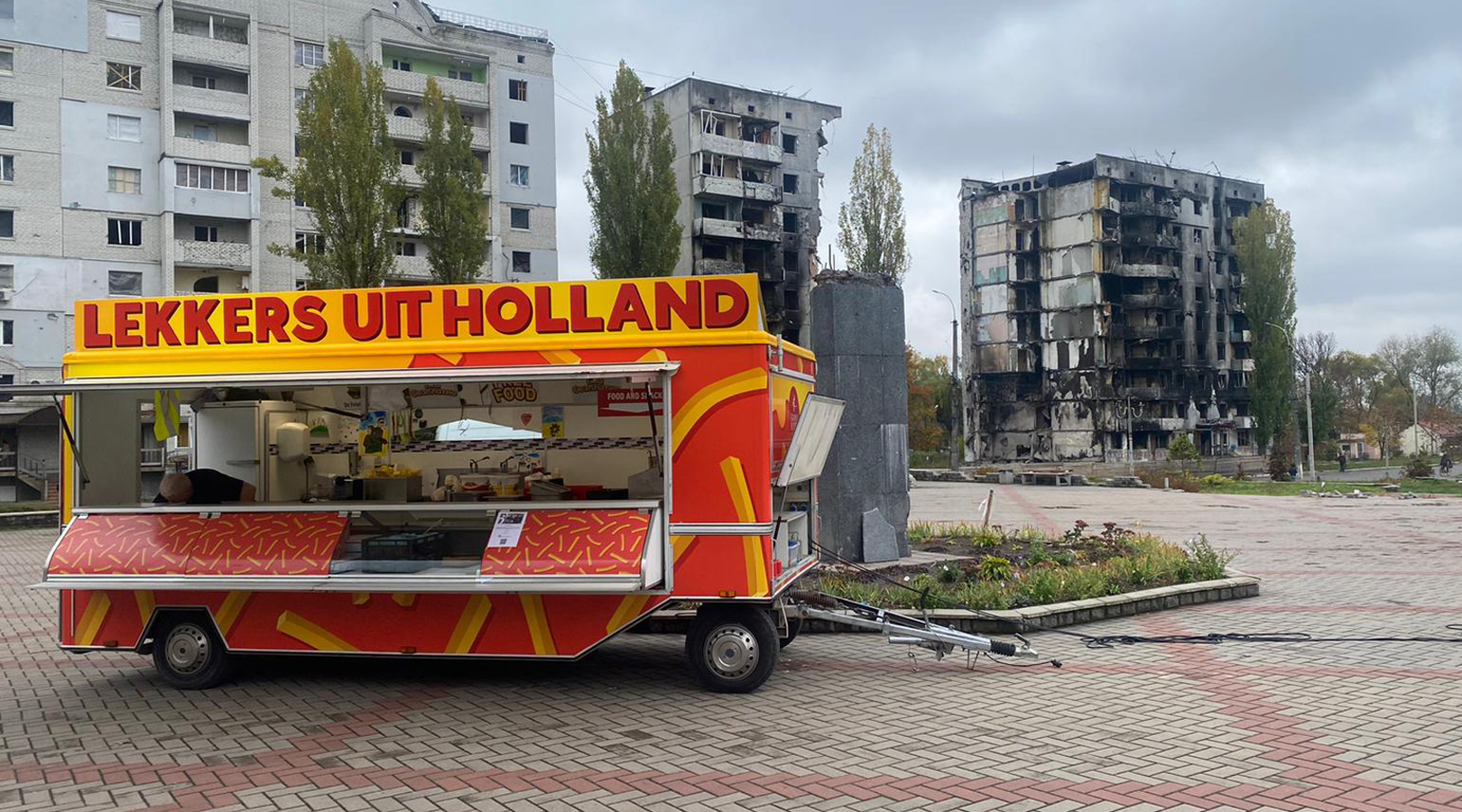
- How are you received in Eastern Ukraine, in the front-line cities?
Franky: - When we go to the East, unfortunately, we don’t see many volunteers. You see volunteers in Kyiv, you see volunteers in Irpin. In the East, you see mostly Ukrainian volunteers and a few large organizations, like World Central Kitchen (a non-profit NGO providing meals to those affected, particularly after natural disasters). Throughout our trips, we mostly encounter journalists—quite a lot of them, but there are almost no foreign volunteers. Many foreign volunteers go to Lviv to deliver aid, maybe to Kyiv, but not to the East.
MIRACLE SURVIVAL AFTER MISSILE STRIKE ON PIZZERIA IN KRAMATORSK
- When did you decide it was time to help Ukrainians in the East?
Franky: - I think it was after we visited Kharkiv. Then it was Kharkiv Oblast, Izium, Sviatohirsk, Avdiivka, Kramatorsk, and so on.
- You mentioned Kramatorsk. Last June, Russia launched a missile strike on a pizzeria in Kramatorsk, killing 13 people, including four children. You survived. Can you tell us about your second birthday?
Soldiers arrived to rescue people, while Russian propaganda claimed, “Look, there were soldiers everywhere.”
Franky: - Yes, we were inside when the pizzeria was attacked by Iskander missiles. We were injured, but only slightly, just by glass. A woman sitting at the next table died. But we survived, and it felt like a second birthday for us. We were incredibly lucky because the pizzeria had three sections. The part where the missile hit was only 12 meters away from us. We had paid our bill literally a minute before the explosion. I wanted to leave a tip, but I only had a 500-hryvnia bill. So, we decided to give the girl 500 hryvnias so she could have a good day. We paid, gave her the tip, and later found out she was among the casualties.
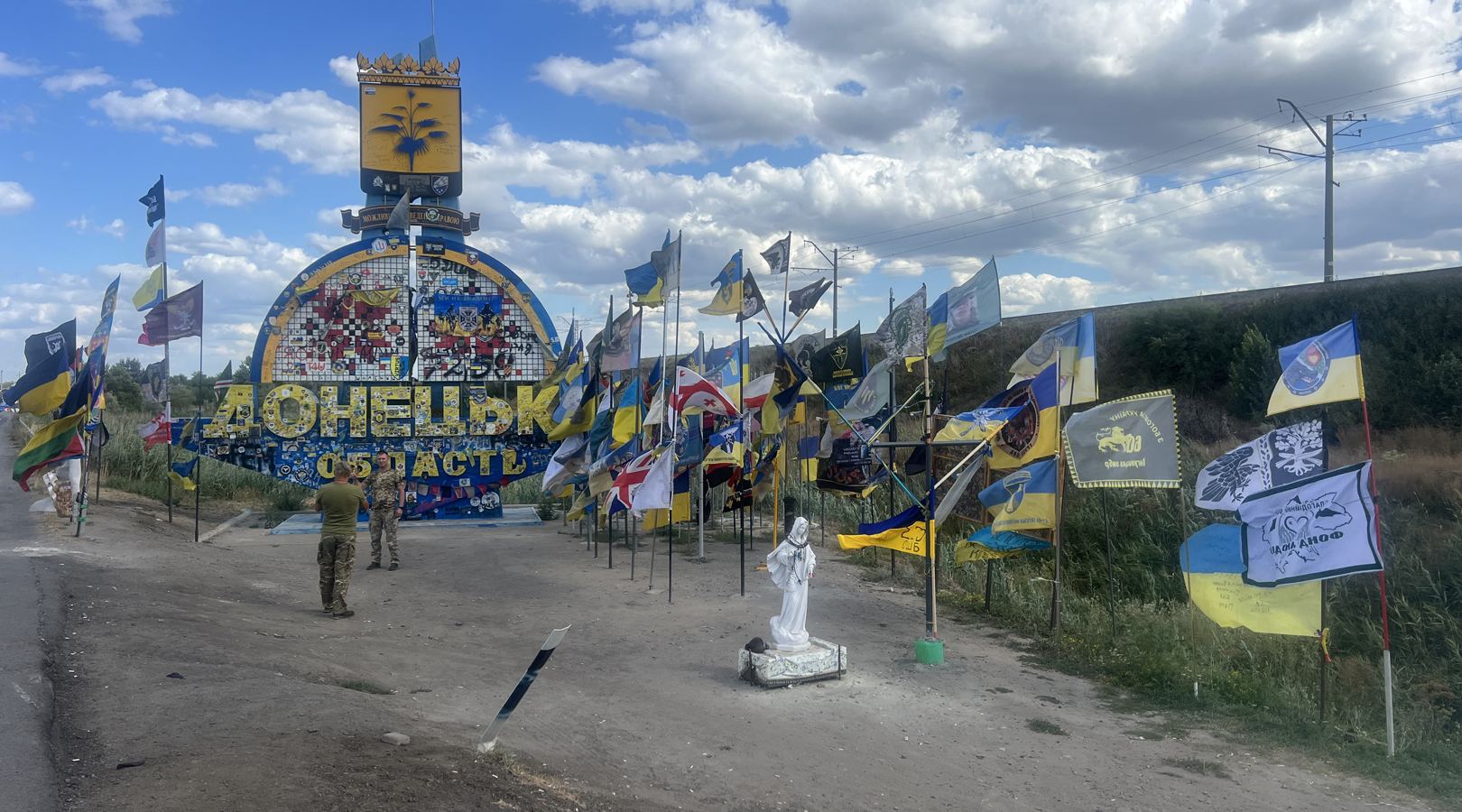
Coen: - This was one of the first videos (shows the video).
Look, I have blood on my face (visible at the end of the video). It was shown on all TV channels. We were very lucky. And you see, there are only civilians here, no soldiers. We were there and saw it. But on Russian TV channels, they showed complete propaganda lies. The military arrived to rescue people, while Russian propaganda claimed, "Look, there were plenty of soldiers." They said it was an attack not on civilians but on military targets.
Franky: - We were there and saw everything with our own eyes. This attack and Russian propaganda only motivate us more to help and support Ukraine.
- You mentioned Russian propaganda. What is the situation with this in the Netherlands, in your opinion? Do you find yourself debunking myths? Are there still unaware people who can’t believe that there is a terrible war going on in Ukraine?
I sometimes hear very strange questions, like, “Do you fly to Ukraine?” And I joke in response: “Yes, F-16s.”
Franky: - Yes, due to the ignorance of some people, I sometimes hear very strange questions, to be honest. For example: “Do you fly to Ukraine?” And I joke in response: “Yes, F-16s.” Most often, people ask if the war is still ongoing. In the news, there isn’t as much detailed coverage of the war in Ukraine anymore. Of course, there are daily reports, but they’re no longer on the front page like before. I also see many people getting their information from Facebook or TikTok and thinking that’s news. And when you say you were there, show videos, they respond that it can’t be true, it’s unreal. It’s just a movie, edited footage, a setup. And this person genuinely believes that. They can’t accept that such a terrible, brutal war is happening. The worst part is that people don’t check information; they aren’t interested in finding the original source.
We also post messages on social media to inform others. I remember one post that got about 88,000 views. There were over 100 comments, and I probably had to delete around 20 due to remarks like, “Why are you helping Nazis?” So, that happens, but it doesn’t mean those are the thoughts of the Dutch people. Anyone can leave a comment; you understand that.
Franky: - I think the majority of people in the Netherlands support Ukraine. At the same time, I think there were more people two years ago. We have to recognize that some are simply tired, as they live in a world where everything is fine. Local news is more important to them because it feels closer to home and affects them directly. However, when the full-scale invasion began, the Dutch opened their doors to Ukrainians. I think the number of Ukrainians and Dutch people living under the same roof has, of course, decreased over time, but people still support Ukraine.
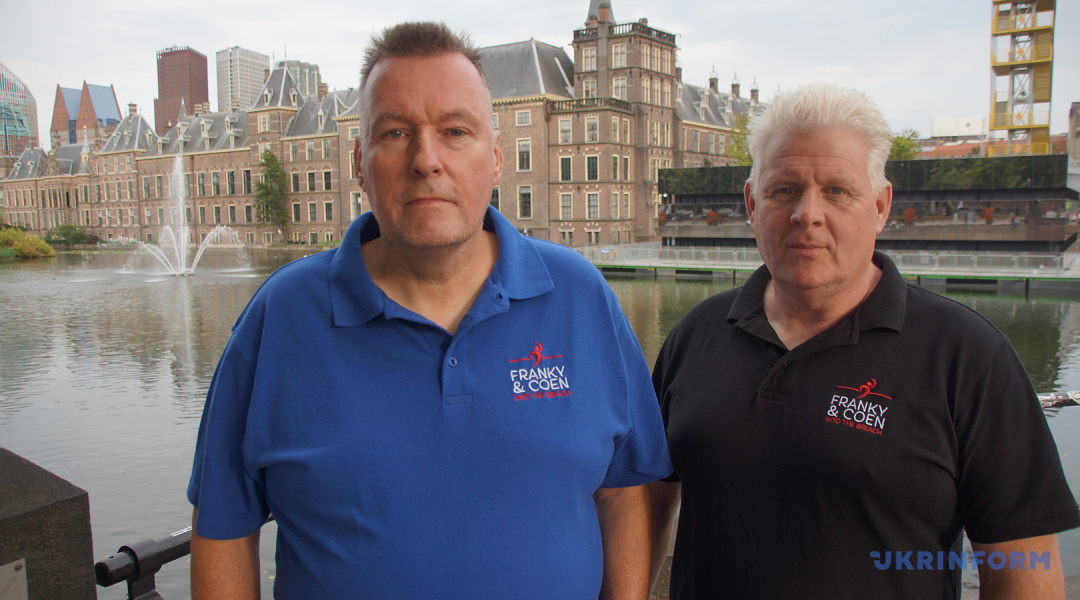
- Why do you not get tired of helping Ukraine, especially after what you experienced in Kramatorsk?
Coen: - We do get tired because it’s a significant emotional burden; it’s hard to process what we’ve seen and the stories we’ve heard, and it’s physically challenging as well. But we haven’t grown tired of Ukraine and the war. Our experience in Kramatorsk only motivated us to help even more actively.
Franky: - Yes, there is physical fatigue, as it’s a drive from the Netherlands to Ukraine by car. Then it’s up and down throughout Ukraine. In the Netherlands, we have flatlands. But no, we haven’t grown tired because we believe that this war is as important to us as it is to Ukraine. People underestimate what this war could lead to if it’s not stopped. If Russia stops fighting, the war will end; but if Ukraine stops fighting, Ukraine will cease to exist. And then it will spread further to other countries like cancer. I am 100 percent certain of this. The Baltic states and Poland have experience and can tell other countries about it.
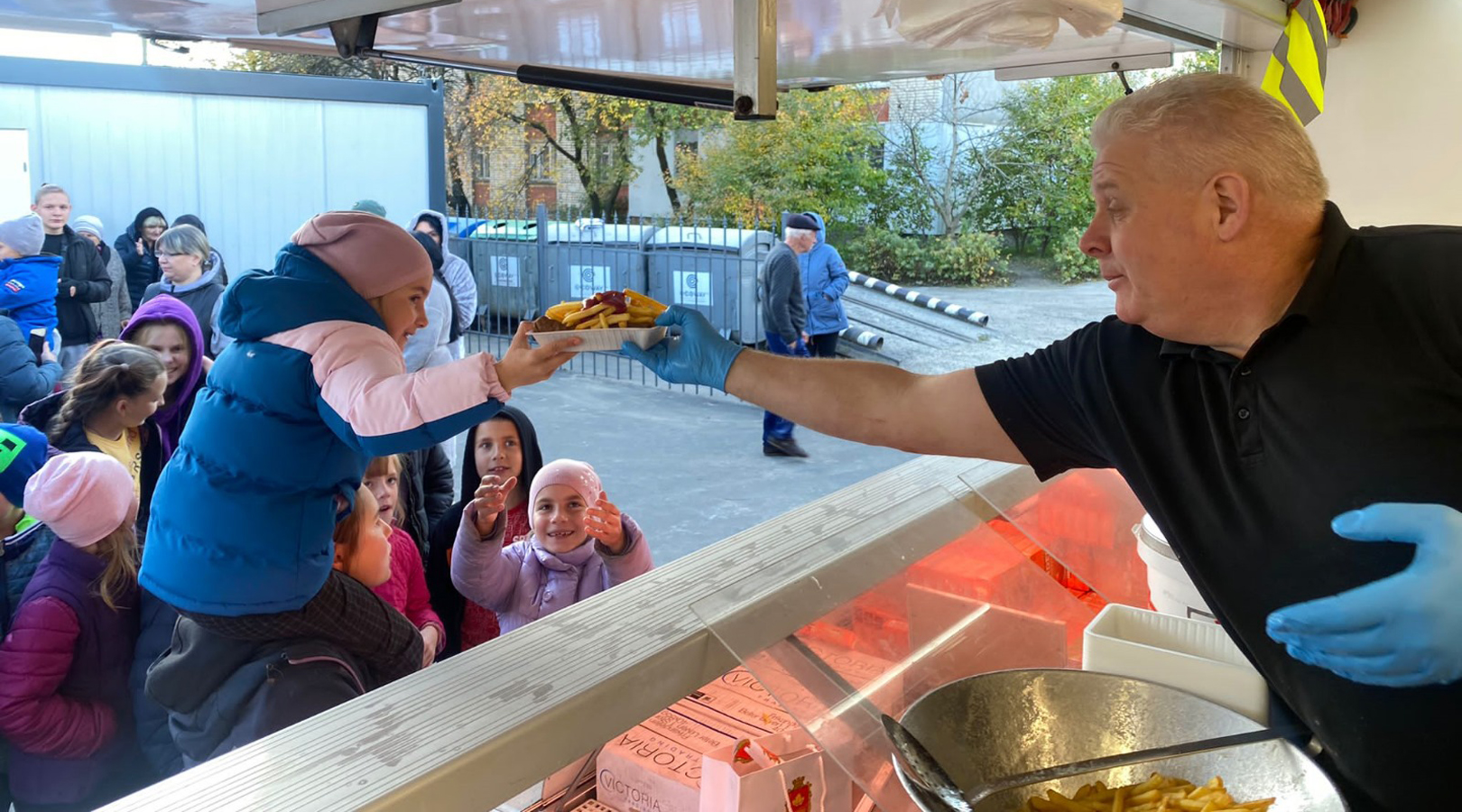
- How often do you travel to Ukraine? Do you have a schedule or travel plan? Who helps you, since feeding such a large number of people costs a lot of money?
Franky: - We spend about 40 percent of our time in Ukraine. At the beginning, it was mostly our own money. However, since we’ve been widely covered in the news, many people know us, and we have a lot of friends and followers on social media who help us. There are also companies that now support us. For example, there’s a Dutch company that helps us with fries and snacks, chicken, cheese soufflé, and so on. If we need 10,000 snacks or 12,000 snacks for Ukraine, there’s no problem. They are always ready to help us and provide substantial support.
This war is as important to us as it is to Ukraine.
Coen: - We help with evacuations, supplying generators and other essential items, as well as drones for the military. We also assist people in repairing their damaged homes by purchasing necessary goods and tools.
Franky: - We also renovated an old hotel in Dnipro and turned it into a temporary shelter. The idea is that people who urgently need a roof over their heads—those who lived practically on the front line—can stop there for a few months to recover and find permanent housing. Then, other war-affected individuals can take their place. It serves as a refuge for people in extreme circumstances.
- How many people can it accommodate?
Franky: - We currently have 18 rooms, but we are still working on some renovations. Once we are fully ready, we will be able to accommodate 70 people, as we will have more space. In an extreme situation, we can, of course, put many mattresses there to provide urgent assistance. We have everything: nice baths, showers, toilets, comfortable rooms. Everything is really well organized.
We hope to find partners to eventually build a more permanent shelter.
Coen: - We also evacuated a shelter for dogs and cats, which involved over 400 dogs and about 56 cats. We bought an old farm in Cherkasy for these animals. So now we have an Animal Support Center.
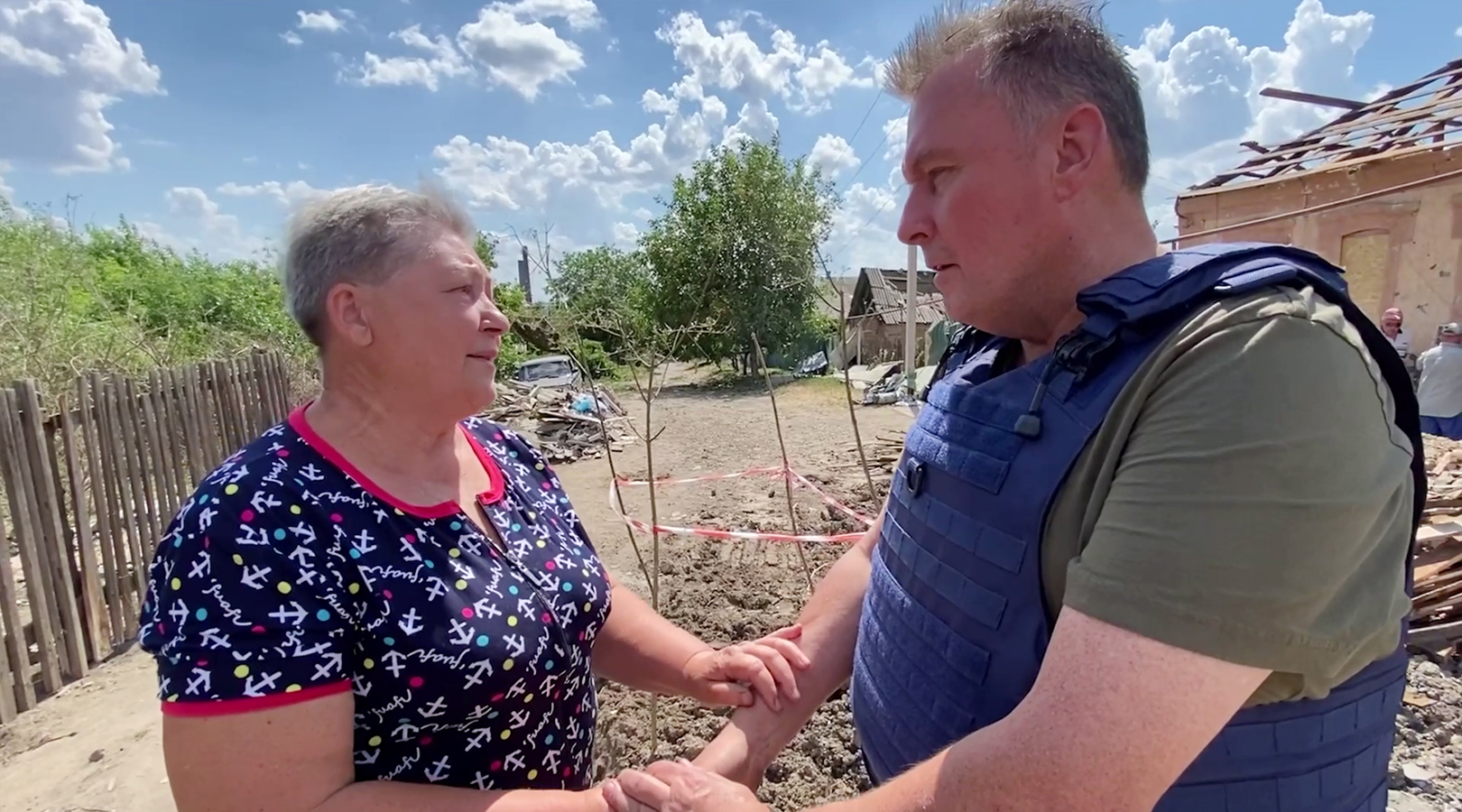
Do you always travel just the two of you, or do you sometimes take friends with you to help?
Franky: - Yes, we travel together. Not everyone is ready to cross the border and see the war firsthand. There's also the risk that a person may not be prepared to work and give their all, especially if you've brought them from the Netherlands and they're with you for 3-4 weeks. So we decided not to bring people from here; it's better to offer jobs and fair salaries to people in Ukraine. If something goes wrong, we can always thank each other and part ways.
Not everyone is ready to cross the border and see the war with their own eyes
- You also help Ukrainian children and recently returned from Poland.
Franky: - Yes, we returned to the Netherlands on October 19. We were with 50 Ukrainian children in Krakow, where we organized a retreat for them. All these children had fled from occupied territories to other cities in Donbas and Zaporizhzhia under Ukrainian control. But it became clear that it was also dangerous there when a bomb hit 15-year-old Yulia’s house two weeks ago. Despite the strong emotions, Yulia was in safe Krakow and could distract herself from the war a little.
Coen: - Now, after spending a few days with this group, they seem like ordinary children because they had the chance to run around, laugh, and play. They could just be kids. However, from time to time, you could see strong worry and sadness on their faces, especially during discussions about unpleasant topics. The situation back home is, of course, very different, and many have lost family and friends during this horrific war. It’s a shame that the war has deprived these children of a normal childhood filled with trips to zoos, amusement parks, and sports events.
- How is the war in Ukraine changing your lives and your families? Franky, your wife is Ukrainian, so she probably understands your risky travels and volunteer work. How does your wife, Coen, react?
Coen: - My wife is from Thailand. I explain everything to her. She supports me and understands it all, but of course, she worries a lot. As for how my life has changed, I’ve become much more emotional than before.
Franky: - My wife is Ukrainian. So, I share my experiences with her after returning from the front lines. Of course, she worries about me a lot. My wife understands the situation very well; she follows the news closely. She can’t sleep at night, tracking where the rockets are headed. So having a Ukrainian wife doesn’t make it any easier. I try to keep her safe.
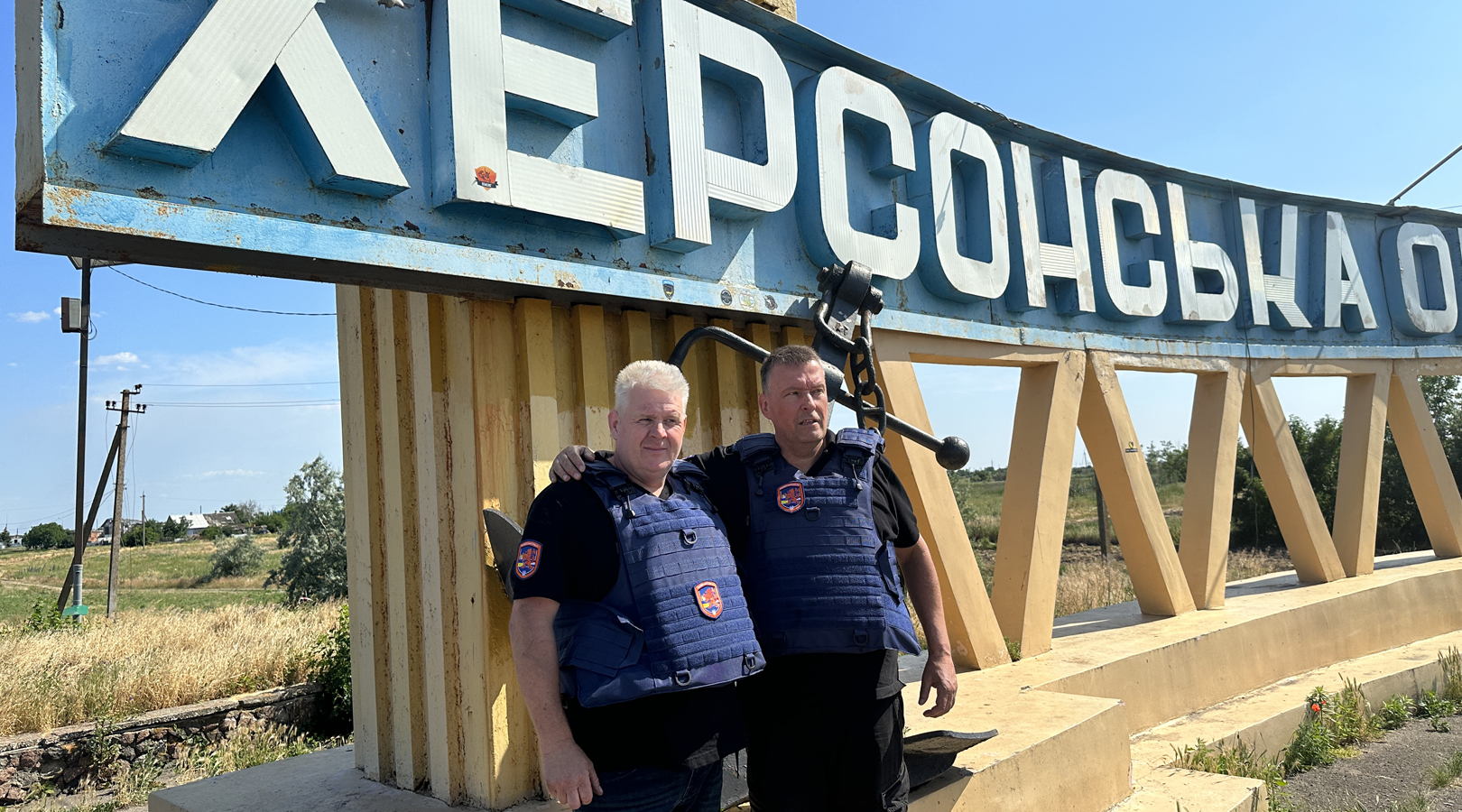
- Have you counted how many times you have been to Ukraine?
Franky: - We have been married for 24 years. My wife is from Kyiv. So I've been to Ukraine many times. We are currently planning our next trip; we are leaving this week. We will be in Ukraine until November 10. We are going back to Donbas. We also plan to visit our temporary shelter in Dnipro. We will personally go for the evacuation of those in need of help, and we also intend to visit our animal shelter in Cherkasy.
- Have you at least approximately counted how much money you have spent supporting Ukraine?
Franky: - Oh, a lot. I don't know. Hundreds of thousands of euros.
- In your opinion, what could put an end to Russia's war in Ukraine?
Franky: - When Russia is expelled. When it loses the war or when different people come to power in Russia. I don’t see any other way to end the war.
The aggressor attacked Ukraine, and this started back in 2014 in Donbas. I am convinced that this is not separatists. I know people who were in Sloviansk and saw with their own eyes how it started. It was not separatists; it was Russians. And that’s how the first part of the war began, and then the second part of the war. I think Russia just thought it could easily do this again because there was no punishment. They hoped it would be a three-day war or maybe a two-week war. I think they really thought so and were surprised when Ukraine showed its teeth. So we need to keep surprising them and work toward Ukraine's victory.
Iryna Drabok, The Hague
Photos by the author and provided by Franky and Coen
